INGREDIENTS
Olive Oil
History
Olive trees now symbolize peace and security, but their history goes back to Greek mythology. According to the famous myth, Poseidon and Athena had a dispute over who should name the city of Athens. The gods decided
that the one who could give the best gift to mankind would have the privilege. Poseidon struck the ground with his trident and a horse sprang forth. But when Athena struck the ground, an olive tree materialized.The gods judged that the tree could be used to prepare food, heal wounds, and give light and so Athena triumphed. The Parthenon, the ultimate symbol of Greek culture, was built in Athena's honor near that very first olive tree.
In Greece, olive oil became a valuable medicinal product for doctors. In fact, Hippocrates wrote of 60 different conditions which could be treated with it, including a variety of skin conditions.
With the fall of the Roman Empire, olive cultivation declined for an entire millennium; however, it remained
an important crop in the land that is now Turkey, where Antioche Soaps are crafted.
Olive Oil Benefits
• Abundant in antioxidants like vitamins A and E, it helps form a protective barrier on your skin to lock in moisture.
• Because it won’t clog pores, it is a great substance to mix with a natural exfoliant like sugar or salt to remove dead skin cells.
• Helps sooth irritated and inflamed skin.
Laurel
History
The Laurel tree’s history is firmly rooted in ancient Greek mythology.
Apollo, the god of all things creative, fell in love with Daphne, the daughter of the river god Peneus. Desperate for her to return his love, Apollo chased Daphne, who wanted nothing to do with him. After running from him
for days, she called to her father for help. The earth opened and before Apollo could reach her, he saw Daphne’s waving hair change into leaves. He saw her
arms become branches; her skin change to delicate bark; and her face turn into a treetop with pink flowers. Her father had transformed her into a laurel tree. Apollo embraced the branches and gathered the leaves and made them into a crown.
Laurel became a much-revered plant in Roman times,
and a wreath made from the leaves became a mark of excellence or a symbol of wisdom for athletes and poets.
Laurel Oil Benefits
• Helps strengthen, purify and balance the skin.
• Rich in vitamin E, it moisturizes and softens even
the most sensitive skin.
• Promotes calm, mental clarity and rest.
Basil
History
Though basil is originally from India, its name is short
for the Greek words basilikon pluton, which mean
“kingly herb” or the Greek word basilicon, meaning
“royal remedy.“
In India, the Hindus believe that the gods Krishna and Vishnu gave basil (tulsi) its protective and inspirational properties. Basil has also been used in Chinese medicine for centuries.
In Europe, basil is a symbol of fertility, and in Italy it is known as a symbol of love because the leaves
resemble hearts.
Basil Essential Oil Benefits
• Used topically, it helps enhance dull-looking skin and
hair as well as treat acne and skin infections.
• Has a restorative effect and can be used to ease
nervous tension, mental fatigue, melancholy, migraines
and depression.
• Helps improve blood circulation to tone the skin.
Lavender
History
Native to the Mediterranean, lavender has been used for centuries to refresh and purify the spirit as well as heal the skin. The name lavender comes from the Latin word lavare, which means “to wash.”
The Egyptian pharaohs used lavender as a perfume and fragrance, and the Greeks used lavender to scent
their bathwater.
During the Middle Ages, lavender gained a reputation as an herbal “cupid” and aphrodisiac, and ever since, lavender has been a beloved herb used to soothe the
mind and the spirit.
Lavender Oil Benefits
• Has antiseptic, antibacterial and therapeutic effects for skin of all types.
• Promotes healing and helps prevent tissue degeneration.
• Helps stimulate the growth of new skin cells.
Rosemary
History
Another herb native to the Mediterranean, rosemary comes from the Latin word rosmaris which means “dew of the sea,” a reference to rosemary’s refreshing effects on the spirit.
Students in ancient Greece would wear garlands of rosemary to increase their memory, which is how it became known as the “Herb of Crowns.”
Rosemary has long been recognized as a symbol of remembrance, and in the Middle Ages, newlywed couples would plant a branch of rosemary on their wedding day as a symbol of their love and union.
Rosemary Oil Benefits
• Helps increase blood flow to skin to improve complexion while removing toxins.
• Helps tone and firm aging skin.
• Antibacterial properties promote healing of acne
and eczema.
Thyme
History
With a name derived from the Greek word thumus, thyme was prized by ancient Greeks and Romans for its invigorating properties.
The Romans introduced thyme into Britain and Europe where it became popular as a seasoning and a medicine.
In the Middle Ages, noble women embroidered sprigs of thyme onto scarves for their favorite knights upon departure for the Crusades.
In the Victorian era, thyme was placed under pillows for prophetic dreams and to improve the memory.
Thyme Oil Benefits
• Stimulates blood flow to skin tissue to tone and revive skin.
• Has antibacterial and antiseptic properties to help heal skin.
• Soothes respiratory problems including coughs and chest congestion.
Olive Oil
History
Olive trees now symbolize peace and security, but their history goes back to Greek mythology. According to the famous myth, Poseidon and Athena had a dispute over who should name the city of Athens. The gods decided
that the one who could give the best gift to mankind would have the privilege. Poseidon struck the ground with his trident and a horse sprang forth. But when Athena struck the ground, an olive tree materialized.The gods judged that the tree could be used to prepare food, heal wounds, and give light and so Athena triumphed. The Parthenon, the ultimate symbol of Greek culture, was built in Athena's honor near that very first olive tree.
In Greece, olive oil became a valuable medicinal product for doctors. In fact, Hippocrates wrote of 60 different conditions which could be treated with it, including a variety of skin conditions.
With the fall of the Roman Empire, olive cultivation declined for an entire millennium; however, it remained
an important crop in the land that is now Turkey, where Antioche Soaps are crafted.
Olive Oil Benefits
• Abundant in antioxidants like vitamins A and E, it helps form a protective barrier on your skin to lock in moisture.
• Because it won’t clog pores, it is a great substance to mix with a natural exfoliant like sugar or salt to remove dead skin cells.
• Helps sooth irritated and inflamed skin.
Laurel
History
The Laurel tree’s history is firmly rooted in ancient Greek mythology.
Apollo, the god of all things creative, fell in love with Daphne, the daughter of the river god Peneus. Desperate for her to return his love, Apollo chased Daphne, who wanted nothing to do with him. After running from him
for days, she called to her father for help. The earth opened and before Apollo could reach her, he saw Daphne’s waving hair change into leaves. He saw her
arms become branches; her skin change to delicate bark; and her face turn into a treetop with pink flowers. Her father had transformed her into a laurel tree. Apollo embraced the branches and gathered the leaves and made them into a crown.
Laurel became a much-revered plant in Roman times,
and a wreath made from the leaves became a mark of excellence or a symbol of wisdom for athletes and poets.
Laurel Oil Benefits
• Helps strengthen, purify and balance the skin.
• Rich in vitamin E, it moisturizes and softens even
the most sensitive skin.
• Promotes calm, mental clarity and rest.
Basil
History
Though basil is originally from India, its name is short
for the Greek words basilikon pluton, which mean
“kingly herb” or the Greek word basilicon, meaning
“royal remedy.“
In India, the Hindus believe that the gods Krishna and Vishnu gave basil (tulsi) its protective and inspirational properties. Basil has also been used in Chinese medicine for centuries.
In Europe, basil is a symbol of fertility, and in Italy it is known as a symbol of love because the leaves
resemble hearts.
Basil Essential Oil Benefits
• Used topically, it helps enhance dull-looking skin and
hair as well as treat acne and skin infections.
• Has a restorative effect and can be used to ease
nervous tension, mental fatigue, melancholy, migraines
and depression.
• Helps improve blood circulation to tone the skin.
Lavender
History
Native to the Mediterranean, lavender has been used for centuries to refresh and purify the spirit as well as heal the skin. The name lavender comes from the Latin word lavare, which means “to wash.”
The Egyptian pharaohs used lavender as a perfume and fragrance, and the Greeks used lavender to scent
their bathwater.
During the Middle Ages, lavender gained a reputation as an herbal “cupid” and aphrodisiac, and ever since, lavender has been a beloved herb used to soothe the
mind and the spirit.
Lavender Oil Benefits
• Has antiseptic, antibacterial and therapeutic effects for skin of all types.
• Promotes healing and helps prevent tissue degeneration.
• Helps stimulate the growth of new skin cells.
Rosemary
History
Another herb native to the Mediterranean, rosemary comes from the Latin word rosmaris which means “dew of the sea,” a reference to rosemary’s refreshing effects on the spirit.
Students in ancient Greece would wear garlands of rosemary to increase their memory, which is how it became known as the “Herb of Crowns.”
Rosemary has long been recognized as a symbol of remembrance, and in the Middle Ages, newlywed couples would plant a branch of rosemary on their wedding day as a symbol of their love and union.
Rosemary Oil Benefits
• Helps increase blood flow to skin to improve complexion while removing toxins.
• Helps tone and firm aging skin.
• Antibacterial properties promote healing of acne
and eczema.
Thyme
History
With a name derived from the Greek word thumus, thyme was prized by ancient Greeks and Romans for its invigorating properties.
The Romans introduced thyme into Britain and Europe where it became popular as a seasoning and a medicine.
In the Middle Ages, noble women embroidered sprigs of thyme onto scarves for their favorite knights upon departure for the Crusades.
In the Victorian era, thyme was placed under pillows for prophetic dreams and to improve the memory.
Thyme Oil Benefits
• Stimulates blood flow to skin tissue to tone and revive skin.
• Has antibacterial and antiseptic properties to help heal skin.
• Soothes respiratory problems including coughs and chest congestion.

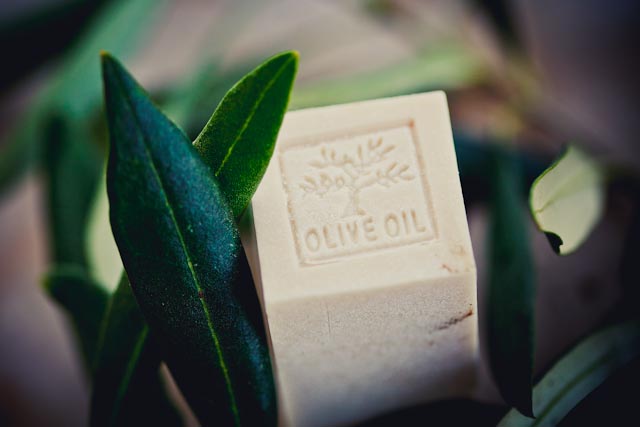
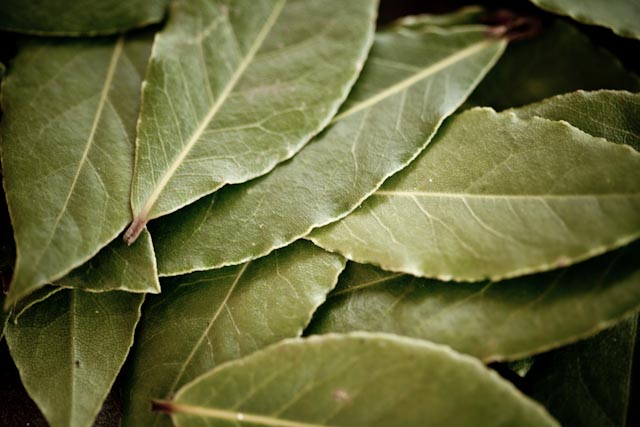
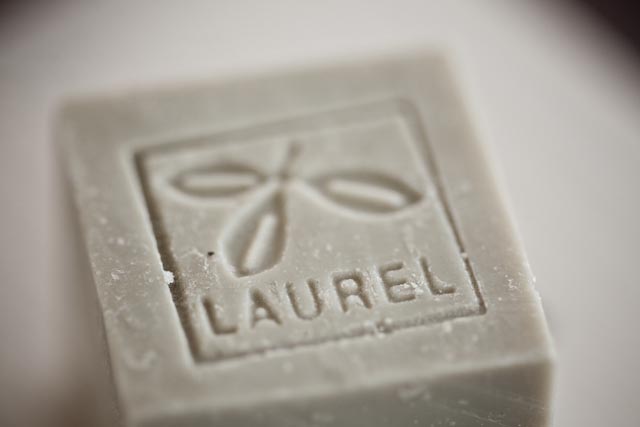
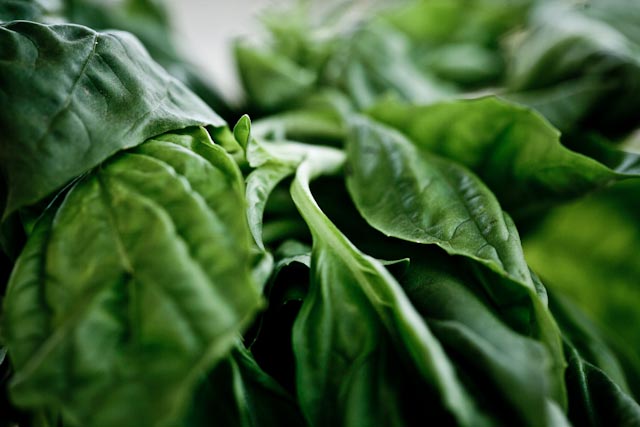
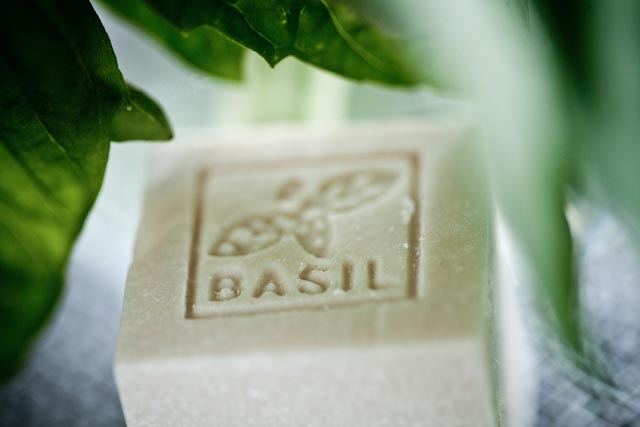
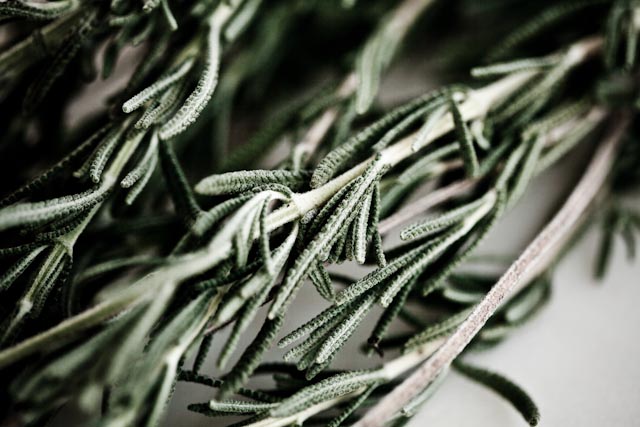
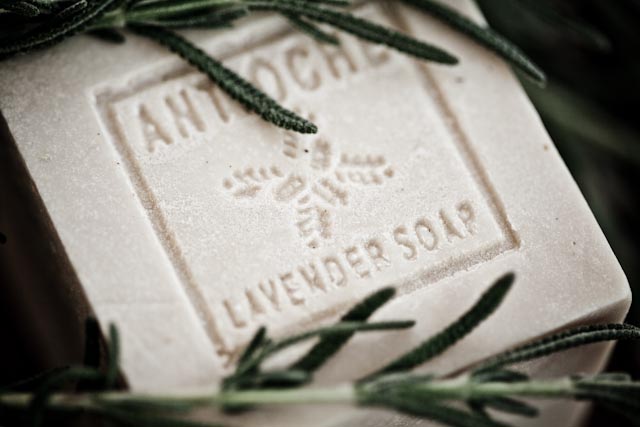

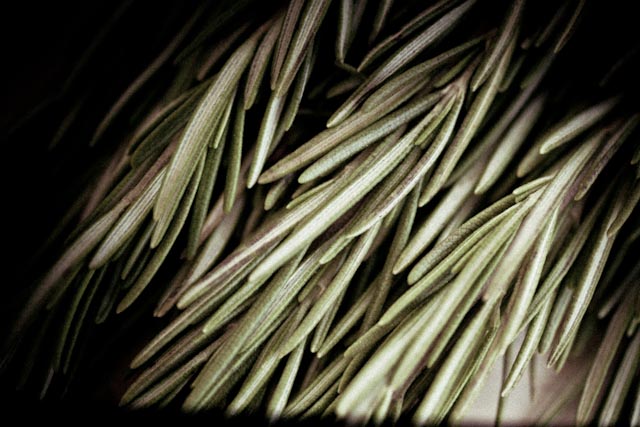
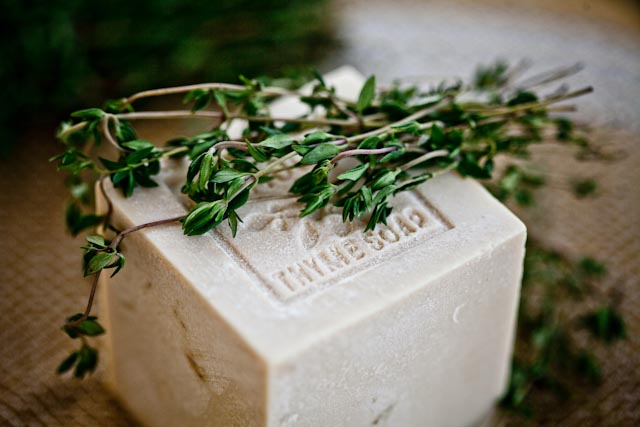
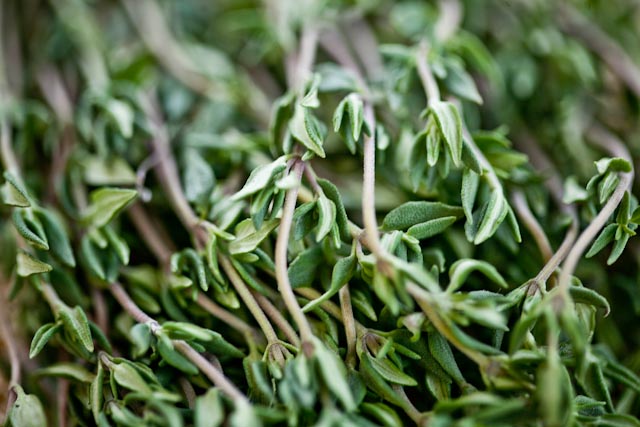
Copyright © 2011 Antioche Olive Oil Soaps. All rights reserved.
